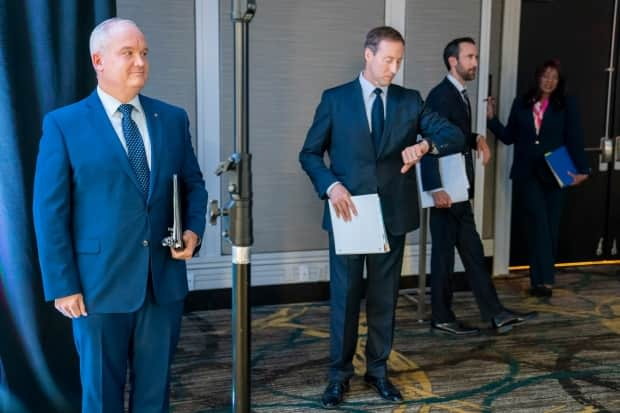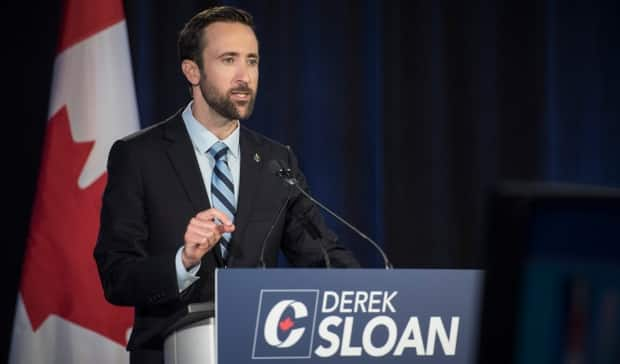Erin O'Toole moves to shake off the Trumpian taint
Erin O'Toole's decision to issue a 595-word statement on Sunday about his political beliefs suggests he's at least a little worried about his public image.
And he might have good reasons to worry. But the question of what kind of conservative Erin O'Toole wants to be is still difficult to answer.
"If the Liberals want to label me as 'far right,' they are welcome to try," O'Toole said in a statement sent to reporters Sunday morning. "Canadians are smart and they will see this as an attempt to mislead people and import some of the fear and division we have witnessed in the United States."
The "extreme right" allegation was contained in a fundraising email the Liberal Party sent to its supporters last week. The message was part of a week-long effort by Liberals to link O'Toole's party with the Trumpian style of politics. The Conservative Party had, for example, previously accused the Liberals of "rigging" the last election. O'Toole, the Liberals noted, campaigned for the party leadership on a pledge to "take back Canada."
However much O'Toole might want to seem undaunted in the face of Liberal charges, he's not in a position to assume these attacks will fail. Donald Trump's politics have been shown to be even more poisonous than previously understood. Anything that sounds even remotely similar to Trump is in danger of being considered unacceptably toxic in Canadian public life.
Pitching for the 'centre'
But O'Toole's own image is also vulnerable. At the end of 2020, according to Abacus Data, 28 per cent of Canadians viewed O'Toole negatively, compared to 20 per cent who viewed him favourably. At the end of November, the Angus Reid Institute found a similar deficit: 36 per cent had a favourable opinion of the Conservative leader, 42 per cent had an unfavourable opinion.
Given the threat of a Trumpist stain and the weakness of O'Toole's brand, some kind of response to the Liberals' criticism was probably necessary. But simply not being Trump is a poor measure of anything and O'Toole's weekend statement also points to a more interesting matter for the Conservative leader — defining his approach to conservatism.

In his defence, O'Toole touted a number of his beliefs and political positions on Sunday. He has said he wants the Conservative Party to welcome "all Canadians, regardless of race, religion, economic standing, education, or sexual orientation" and to "govern on behalf of all Canadians."
He says he is pro-choice and believes the party must take inequality "seriously." He has "lamented the decline of private sector union membership" and "raised the unfairness of the blood ban for gay men." His first question in the House of Commons as Conservative leader was about reconciliation with Indigenous peoples.
"The Conservatives are a moderate, pragmatic, mainstream party — as old as Confederation — that sits squarely in the centre of Canadian politics," O'Toole said, adding that he would "work tirelessly to restore public confidence in their political leaders and federal institutions."
The political positions O'Toole described sound quite unlike those commonly associated with Donald Trump. In fact, many of those things might be more commonly associated with liberal or 'progressive' politicians.
'True blue' vs. 'mushy middle'
But Sunday's statement didn't include O'Toole's previously stated desire to "fight" to "defend our history, our institutions against attacks from cancel culture and the radical left." That was an idea that O'Toole put front and centre when he announced his candidacy for the Conservative leadership in January 2020.
In that campaign — which raised questions about O'Toole's edgier new tone — O'Toole touted himself as the "true blue" Conservative option and suggested that Peter MacKay, the early frontrunner, would turn the Conservative party into "Liberal party lite." The choice, O'Toole said, would be between running on principles and running toward the "mushy middle."
During that leadership race, O'Toole was also one of only two members of the party's Ontario caucus to vote against calling on fellow leadership candidate Derek Sloan to apologize for Sloan's attack on Theresa Tam, Canada's chief public health officer (Sloan was the other member).

On Monday, after it emerged that Sloan had received a donation from a white nationalist, O'Toole announced that he was moving to eject Sloan from caucus and would prohibit him from running as a Conservative in the next election.
O'Toole's assertion now that the Conservative Party should sit "squarely in the centre of Canadian politics" might not contradict his aversion to the "mushy middle." But reconciling those two ideas does require some explanation.
O'Toole has softened his tone since becoming leader and hasn't emulated colleagues who have warned about a "socialist coup" or "great reset" emerging in the wake of the pandemic. But in a speech in October — the same speech in which he expressed concern about inequality and union membership — he did strike an explicitly populist tone, arguing that "middle-class Canada has been betrayed by the elites on every level: political elites, financial elites, cultural elites."
These elites, O'Toole said, "have only one set of values centred on unchecked globalization [and] political correctness ... while middle-class Canadians have had another set rooted in family, home and nation." He subsequently expanded that into a theory of "somewheres" and "anywheres."
While speaking to a group of campus Conservatives about residential schools in October, he also said that "most of the lefty radicals are also the dumbest people at your university."
So "lefty radicals" might be entitled to ask whether O'Toole would really govern on behalf of all Canadians. But O'Toole has some other things to explain as well.
It's one thing, for instance, to tell people that you're concerned about inequality or reconciliation or climate change or public confidence in institutions. It's quite another thing to show voters how you would deal with those issues.
Would fighting "cancel culture" compete with such priorities? And what would an "anti-elite" agenda look like? Is O'Toole ready to leave behind some of this populist rhetoric? Does he believe there's a path to be walked here between traditional and populist conservatism? If so, how can the divisive elements of populism be reconciled with the "moderate, pragmatic" party he wants to represent?
During the leadership campaign, O'Toole sought to establish that he wasn't Peter MacKay. Now, ahead of a general election campaign, O'Toole is keen to establish that he's not some aspiring Donald Trump.
But it's not clear where O'Toole plans to locate himself within the vast political landscape that lies between the former leader of Canada's Progressive Conservative party and the soon-to-be-former president of the United States.
In politics, it's not always enough to tell people who you're not. Sooner or later, they're going to want to know who you are.

